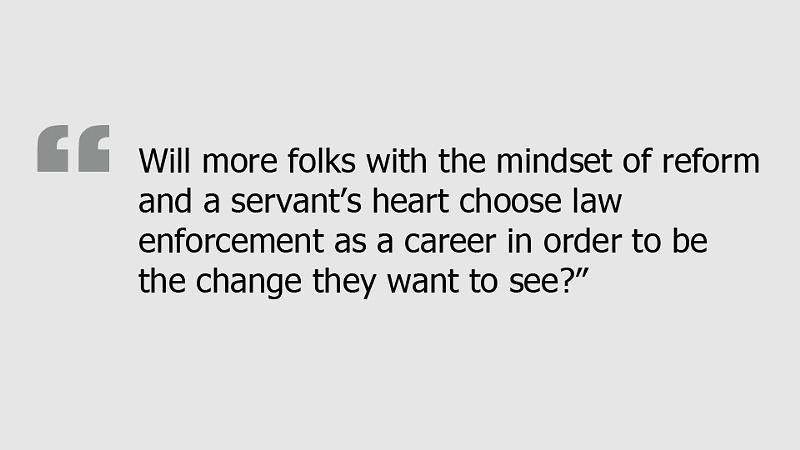EDITOR’S NOTE: CityBeat has invited three local activists to write monthly columns on pressing issues facing Cincinnati. Derek Bauman is a public transit and urbanism activist and also a suburban Cincinnati police officer. His column will appear in CityBeat the third week of each month.
“Every societal failure, we put it off on the cops to solve. Not enough mental health funding, let the cops handle it. … Here in Dallas we got a loose dog problem; let’s have the cops chase loose dogs. Schools fail, let’s give it to the cops. … That’s too much to ask. Policing was never meant to solve all those problems.”
— Dallas Police Chief David Brown, July 11
There has been no shortage of articles, editorials, Facebook posts and general discourse about the latest in the long line of police shootings of black men nationally, a disturbing trend receiving deserved scrutiny.
In light of the retaliatory shooting July 7 in Dallas that left five officers dead, I’d like to expound upon these thoughts by Dallas Police Chief David Brown, who a few days after the tragedy — and with all due respect to the protestors who witnessed but were not involved in the violence that erupted against officers — offered important points to consider as we move forward with efforts to quell the violence.
First, it’s important to note that Brown wasn’t saying that respecting the rights of all our citizens — including black lives — is too much to ask. His concerns are wider than today’s struggle with race and policing, but they are related.
As a young man in the early ’90s seeking a career in law enforcement, I recall taking the Cleveland Police Department civil service test with more than 2,000 other applicants at the downtown Cleveland Convention Center. Eight-foot folding tables full of applicants were lined up as far as the eye could see.
As recently as 2002, when I tested and was subsequently hired at my suburban Cincinnati police department, 450 applicants took the test for two open positions. I was fortunate enough to be one of the two to get a job.
But — in light of a political climate doing little to address the fundamental causes of poverty and inequality, and right-wing politicians giving lip service to supporting police while subsequently gutting union rights — I have to ask:
Who is choosing this career today?
If fewer make this choice, what does that mean for our future, given that more and more is being expected of our officers?
We have always expected our police officers to work dreadful shifts — midnights, weekends, holidays, missing little league games and family events. We’ve expected them to work special events all summer. We’ve expected them to go into dangerous situations, to run toward the gunfire when everyone else was running away, and to deal with the worst that society has to offer on a daily basis.
But so much more is expected and needed today. Like Chief Brown said, we want police officers today to be social workers, crisis-intervention specialists and mental health experts, each blessed with the gift of a golden tongue ready to talk people off of a ledge or defuse and de-escalate dangerous situations with minimal use of force.
And we should expect it.
This is what we need — police officers with a servant’s heart.
Yet we don’t really want to pay for this level of service, to find the resources to attract the types of people who are truly capable of doing the job properly, do we?
With the rise of the tea party across the country over the past decade, particularly here in Ohio, states have cut funding to local governments. This has cost the city of Cincinnati nearly $30 million annually.
Public safety is the largest line item in every municipal budget, with police and fire combined making up 70 percent of Cincinnati’s operating budget.
Meanwhile, Cincinnati police officers have had the following raises in the past four years: 0 percent, 0 percent, 1.5 percent, 0 percent.
This is for an agency that is touted as a model of big-city policing since the Collaborative Agreement, Cincinnati’s much-lauded post-2001 police reforms.
One of the biggest attractions of “government work” has always been the pension and benefits, which in the past attempted to offset the lower salaries than what are offered by the private sector. But since the recession, major changes have been made to public pensions by most localities, which have slashed these benefits.
There have been efforts in Ohio and across the country to do away with public sector collective bargaining, with some suggesting that it’s time to end the “gold-plated pensions” and “Cadillac benefits” of public-sector employees.
The irony is that these arguments come from the political right, which like to present themselves as the most bullish supporters of law enforcement.
Young people today are looking for work-life balance and a collaborative workplace, and they tend to question authority more so than in the past. The fast-changing attitudes of the millennial generation suggest that this group might not agree with many of the laws that they are charged to enforce.
This mindset doesn’t necessarily match with either the schedule or the paramilitary-type command structure of law enforcement, which can be some of the most autocratic, bullying management in the working world.
We give orders. You do it. We’re not asking for your opinions.
Many young people today are looking for higher-paying jobs in order to offset astronomical college debt.
That’s certainly not the offer when it comes to law enforcement jobs, particularly in “right-to-work” states, where police officers today are making $12 and $15 an hour.
Those who might be interested are hearing from their families and friends: “Why would you want that job? It’s dangerous and you’ll be scrutinized endlessly and not appreciated.”
It seems impossible to win, particularly versus what you give up — which ultimately could be your life.
There certainly is the cumulative effect of the day-in and day-out media reporting of horrible mistakes made by some police officers and the fallout that follows.
Current and prospective officers are subject to the daily din of social media, where heated opinions abound. A larger discussion about police use of force in America needs to occur — that discussion will take place far above rank-and-file officers.
The question is: Where do we go from here?
I am concerned for the future because good people are getting out of law enforcement. I’m concerned that the best — those with the skills that are truly needed today — might not be not applying.
The skill set that makes a good police officer today is also in demand in the private sector — and these private-sector jobs come with actual raises, an air-conditioned office and virtually zero threat of not coming home at the end of the day.
How will we attract and retain the good people that we need in policing?
Are we willing to provide the support for the level of service that we need?
Will the political right support police officers with more than rhetoric by getting behind collective bargaining and paying for the caliber of talent that society needs in this important role?
Because right now “the market” and “supply and demand” — two concepts that conservatives hold in such high regard — are working against our collective future. For those who wish to see change in law enforcement culture, we know that change is best effected from within.
Will more folks with the mindset of reform and a servant’s heart choose law enforcement as a career in order to be the change they want to see?
For now it seems there are more questions than answers.
CONTACT DEREK: [email protected].






